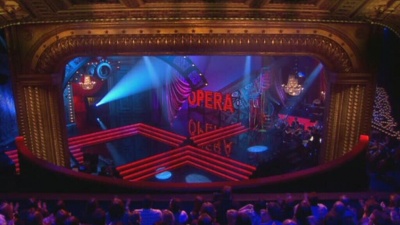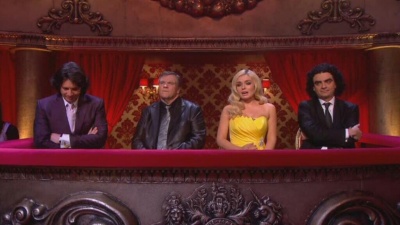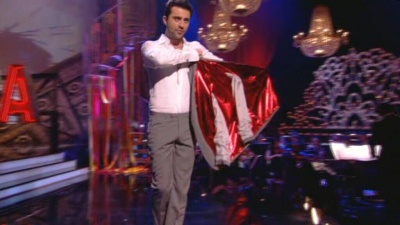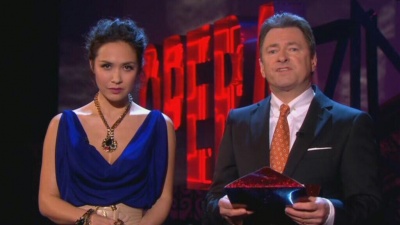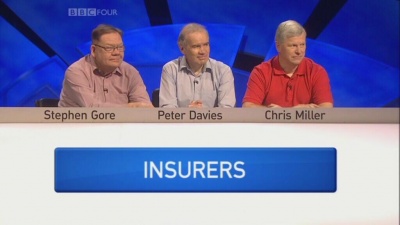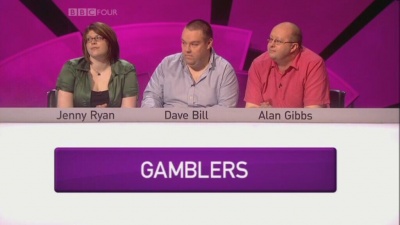Weaver's Week 2010-02-21
m (→Qualification Quarter Final 2: Imperial London v Emmanuel Cambridge: correcting Gilad Amit's given name) |
|||
| Line 40: | Line 40: | ||
</div> | </div> | ||
| - | In the first week, all eight did have to sing an aria from a well-known opera, even including Alex James – not even the singer in his band, clearly here to make the other seven look good, and frankly much more comfortable on [[Maestro]], another show that propelled celebrities into the classical music world. This would seem to be what the format's title would imply, but it was reneged on as early as week two, and the definition of 'opera' was thus stretched to 'whatever could possibly be on a classical-crossover album', such as that well-known [[Eurovision Song Contest|Eurovision]] operatic classic "Volare". Only one of the singers was performing in English, and she was promptly voted out. Indeed, this was the only English-language performance of the series, and that this is so unexpected rather throws the monoglot nature of British television into context; however, all this was still not enough for critics who rounded on the presence of music that was not strictly opera. | + | In the first week, all eight did have to sing an aria from a well-known opera, even including Alex James – not even the singer in his band, clearly here to make the other seven look good, and frankly much more comfortable on [[Maestro (2)|Maestro]], another show that propelled celebrities into the classical music world. This would seem to be what the format's title would imply, but it was reneged on as early as week two, and the definition of 'opera' was thus stretched to 'whatever could possibly be on a classical-crossover album', such as that well-known [[Eurovision Song Contest|Eurovision]] operatic classic "Volare". Only one of the singers was performing in English, and she was promptly voted out. Indeed, this was the only English-language performance of the series, and that this is so unexpected rather throws the monoglot nature of British television into context; however, all this was still not enough for critics who rounded on the presence of music that was not strictly opera. |
They also criticise the show for giving the impression it is easier to get into opera than it really is. This is not a point without merit, for opera singers do tend to have many years of vocal training under their belts before any sort of career on stage even begins, but perhaps is exaggerated by a certain degree of jealousy and insecurity. Did anyone watch ''Faking It'' with the impression that it made the skills learned in those shows seem trivial? Perhaps the ferocity of the backlash reveals a lot about the elitist attitudes to opera within opera itself. | They also criticise the show for giving the impression it is easier to get into opera than it really is. This is not a point without merit, for opera singers do tend to have many years of vocal training under their belts before any sort of career on stage even begins, but perhaps is exaggerated by a certain degree of jealousy and insecurity. Did anyone watch ''Faking It'' with the impression that it made the skills learned in those shows seem trivial? Perhaps the ferocity of the backlash reveals a lot about the elitist attitudes to opera within opera itself. | ||
Current revision as of 17:06, 6 October 2021
Last week | Weaver's Week Index | Next week
Not even Weaver's Week can watch every programme on the television. That's why we occasionally* have reviews from guest contributors. This week, KP from Bother's Bar tells us all about ITV's latest Friday night show.
* – OK, it's our first guest review in years. We don't mean to leave it so long.
Contents |
Popstar to Operastar
Renegade Pictures / Globe Productions / LWT for ITV, 15 January – 19 February
ITV are not yet shot of their public service broadcasting commitments, but all too often act as though they wish they could be. The end of the afternoon CITV strand has been discussed on these pages before; more recently, The South Bank Show has also been put to pasture, leaving a gaping hole in ITV's arts coverage that has to be filled somehow, and preferably by something that will draw an audience that advertisers might want to sell their wares to.
And so it is that we get this. Take a celebrity reality format, and apply it to the world of opera. The interesting twist here is that the celebrities are in fact established singers in the domain of contemporary music, music ITV1 viewers might actually listen to. It's a genuinely interesting twist, because it prods and tests the notion that classical music is a world removed from popular music. Or, specifically, that classical singing is a world removed from popular singing.
Within seconds, it is clear that the notion that they're promoting to build up the show is that it is. Oh, and there's the glass-shattering soprano stereotype (of which more later) evident in both the introduction and the oh-so-convenient inclusion of chandeliers on the theatrical set.
Alan Titchmarsh and Myleene Klass are the moderately obvious hosts, and they have a good line in hyperbole and dreadful puns, but they're nowhere near as important to this format as the teachers. How are these singers going to be trained in this apparently utterly different territory? Two classical singers take responsibility; Rolando Villazon (tenor) and Katherine Jenkins (mezzo-soprano). Unusually but pleasantly, these "mentors" are judges too; it's the first ITV singing contest to have the vocal coach on the panel, although the BBC did it on Fame Academy years ago.
Joining them are Meat Loaf (tenor) and Laurence Llewellyn-Bowen (non-singer): "Meat" (and Mr. Titchmarsh really does use that as a first name on occasion) seems to be wasted at times (in every sense of that word), Llewellyn-Bowen is there for comic relief but ironically is sometimes more critical than the mentors. How he is qualified to comment is not especially clear – a Classic FM show, apparently, but this correspondent thought the most he knew about orchestral music was being the first person ever to hear a certain part of Strachan and Strachan's 1998 magnum opus in its intended context.
The format is nothing you haven't seen before. Video footage of the preparation, which should be a bit more interesting than it is; the performance; the critique; repeat until all have performed, then open the phone lines. With no separate results show, we have the intra-show short voting window from Britain's Got Talent, which is never reassuring from ITV in a post-0898gate era, but at least there's enough padding to make this window almost reasonably long. 30% of the phone-in revenue goes to a music therapy charity – compared to the 0% of ITV's other celebrity talent contest – and the elimination format that Simon Cowell has used, then disowned, on The X Factor is copied lock, stock and barrel here. Down to the judges showing a hilarious penchant for engineering a DEADLOCK!!!!!. Or, as Mr. Titchmarsh more calmly calls it, a tie. The only other vaguely novel twist here was that the semi-final reduced four singers to two, in order that the two finalists could each duet with one of the mentors.
There's really not much else to say about the show directly. It's (Celebrity) X Factor in posh frocks, at its simplest, and almost every flaw of that format is on show here; the hyperactive audience, the misleading editing, the general sense that the producers may be implicitly favouring one performer over another, the inane comments from those supposedly critiquing the performances. The last of these particularly angered the show's detractors, but then so did almost everything about the show, and with little else to say about the show as a show, this review will focus on those criticisms.
One bugbear is how the performances are amplified, contrary to the classical tradition, and regularly transposed – again, contrary to the classical tradition. In many cases, this is simply a matter of having to work around truly mystifying choices of music for the singers. Take the first show, for instance; Darius Campbell, a veteran of ITV casting shows, was shafted with "Nessun dorma", a ridiculously well-known tenor aria, especially famous for its high note at the end. Darius is a bass-baritone, and was forced to sing the piece in an unrecognisably low key. Why they did this, while the rather higher voice of Danny Jones was handed the baritone aria "La donna e mobile", is frankly bordering on the inexplicable.
In the first week, all eight did have to sing an aria from a well-known opera, even including Alex James – not even the singer in his band, clearly here to make the other seven look good, and frankly much more comfortable on Maestro, another show that propelled celebrities into the classical music world. This would seem to be what the format's title would imply, but it was reneged on as early as week two, and the definition of 'opera' was thus stretched to 'whatever could possibly be on a classical-crossover album', such as that well-known Eurovision operatic classic "Volare". Only one of the singers was performing in English, and she was promptly voted out. Indeed, this was the only English-language performance of the series, and that this is so unexpected rather throws the monoglot nature of British television into context; however, all this was still not enough for critics who rounded on the presence of music that was not strictly opera.
They also criticise the show for giving the impression it is easier to get into opera than it really is. This is not a point without merit, for opera singers do tend to have many years of vocal training under their belts before any sort of career on stage even begins, but perhaps is exaggerated by a certain degree of jealousy and insecurity. Did anyone watch Faking It with the impression that it made the skills learned in those shows seem trivial? Perhaps the ferocity of the backlash reveals a lot about the elitist attitudes to opera within opera itself.
Besides, is opera really that wildly different from more contemporary types of singing? Well, yes and no and a hefty dollop of maybe. Besides the stereotype-defining use of vibrato, it is the different vocal mechanisms used that make the main difference – female pop singers tend to take their chest register about an octave higher than their classical counterparts, and many leave their head register completely unused (notwithstanding a trend towards those who do not in the last year, such as Florence "And The Machine" Welsh and Elly "La Roux" Jackson). As a result of that, anything remotely high gets noticed, and wildly over-applauded. Katherine Jenkins (mezzo-soprano, remember) appearing on camera envying the sopranos for their range reinforces this pattern.
All told, though, the differences are perhaps not nearly as great as either classical singers or this show might make out, and certainly it is very elitist to place classical singing as inexorably above pop singing, the former as high art, the latter as low and vulgar. There are a growing number of singers and teachers with experience of each, and their opinions vary, but very few comment on the yawning chasm between styles this show suggests, probably because there isn't one. There are methods and vocal conventions in each, true, but there is another school of thought, the Estill Method, that reduces all of this to physiological differences in how sound is made, and it's gained traction amongst many teachers. Including, it should be noted, Yvie Burnett, classical singer and now vocal coach on the Simon Cowell formats. This correspondent still believes she'd have made a better teacher for this than Jenkins.
Perhaps the best summary of the dichotomy of this show was an advert in week four for the hilariously-named gambling website poshbingo.com, selling that very working-class pursuit of bingo in upper-class clothing. It's still bingo! Similarly, this may be a show dominated by classical singing (operatic arias or not), and nearly all in foreign languages, but it's still an ITV casting show. A clash of cultures that doesn't really work, and is worthy of at least some of the criticism it has received, but sometimes it is that clash that makes it fascinating television. As long as this really isn't the shape of all of ITV's future arts coverage, it's hard to really slate this show, and it's certainly not as bad as Take Me Out.
Many thanks to KP for that guest review! If you'd like to contribute a guest review, do make contact through the web site. The main thing we ask: have something to say. And now, more from your regular writer.
University Challenge
Qualification Quarter Final 2: Imperial London v Emmanuel Cambridge
Imperial has already beaten Southampton, St Hugh's Oxford, and Edinburgh; Emmanuel lost their first round match to Regent's Park Oxford then came through the repechage, beating Christ's Cambridge, UCL, and Jesus Oxford. The winners go straight through to the semi-finals, where the losers might yet join them if they can win over the winners of one of the matches between the losers.
Just for a change, we'll begin with Digit of the Week: almost inevitably, it's 7. The side then goes two-for-three on questions about the three Rs. Imperial do well on incidents of Incidents in history. Does no-one study basic Marxist theory any more? Do they not recognise the dictatorship of the proletariat? Anyway, though Imperial briefly had a 50-point lead, two starters and subsequent bonuses from Emmanuel reduce it to exactly nothing by the first visual round. It's Name That Death Mask, four historical figures preserved forever in mask form. Imperial get the questions, and lead 65-45.
There's another well-written starter telling the story of a character who killed himself because he thought he heard of the death of his lover Thysbe. As soon as the question ends, people are hitting the buzzers. Non-practitioners will be surprised that anyone can connect two classes of yoga as Alex Guttenplan did. Jenny Harris guesses "Plutarch" for the next starter; that becomes a Hidden Play, as it gives Emmanuel the bonuses and a short-lived 40-point lead.
It doesn't last: Imperial have knowledge of the flags of English counties, but then Emmanuel take the Roman numerals out of MODEL (MDL) to produce 1550. Their reward is a set of bonuses on fish. The audio round is on the proper Classical composers, as in those working from 1750-1815 (ish), and Emmanuel leads 120-85. They move further ahead with the demarcation between India and Pakistan, and bonuses on Faust. Imperial know the limits of Newtonian mechanics, and how it only works when there are two bodies in a universe of frictionless surfaces. They do well on paintings in the National Portrait Gallery, and do so just when Emmanuel were building up a head of steam.
Instead, Imperial are demolishing the gap, picking up Henry VI's ailment (gout), knowing the derivation of the sublime and mikado. The works of Warhol derails both sides, and Emmanuel's lead – which was 70 points – is now 155-135. It's the first time in the entire show that the sides have had to think about their responses. Emmanuel re-build their lead with Plank's constant and internal intelligence agencies of overseas countries. With four minutes to go, rivers in mythology wrap up Emmanuel's win, all they have to do is avoid any missignals and they're there.
So Emmanuel go and get the next starter, on the career of Bob Dylan, so that they really can't lose. Kazakhstan's capital city has given its name to a cycling team, and one of their football sides liked the songs of Mika so much they changed their name in his honour. Such has been the speed that any thought on the bonuses is unusual. At the gong, Emmanuel has won handsomely, 275-160. They were led by Alex Guttenplan's eight starters, but the bonus conversion rate – 29/42 – is remarkably good, particularly at this stage of the contest. Gilad Amit had four for Imperial, whose conversion rate was a scarcely less-spectacular 16/24. The sides combined for 67/94 right on the night.
One question was left hanging on the broadcast: the capital of Australia before 1927 was Melbourne. The teams all knew it, but the gong went before they could buzz in.
Next: (EQF2) Edinburgh v Jesus Oxford
Then: Winner EQF2 v Manchester
Later: Girton Cambridge v Imperial London
Only Connect
Heat 7: Insurers v Gamblers
Shut up, Thumper, we want you to stop, because Victoria has questions so sharp that she can't run with them lest she trips and injures someone. The Insurers have all worked in the insurance industry, and the Gamblers are all involved in betting. They're in it for the money, which means they've come to the wrong show, because the sides are competing for the glory.
The Insurers won the toss and elected to defer, so the Gamblers kick off with some places and dates. They turn out to be the years these bodies of water last froze over. The Insurers buzz in a little too soon on their question, it turns out to be numbers in various languages that have the same number of letters as the number they're describing, and a bonus for the gamblers. But just one, not that many letters. Gamblers have the good luck to get pictures of bingo calls, and claim three points.
Insurers are back, with people and years, muttering about spies, but fail to buzz in at all. These were people who were all stripped of their knighthoods – Caravaggio lost his for brawling with seven armed knights,we're told. Gamblers have the audio set, and we must put up a WARNING that this round contains Su Pollard singing. And Gamblers recognising her and Busted, but not recognising The Marriage of Figaro. The final set begins with "The Joy of Chickens" and goes downhill: it is winners of the Most Bonkers Book Title of the Year. The Gamblers have a good lead, 7-2.
What comes fourth is the question in round two. Gamblers get some names. Secretaries of state for something or other? It'll be a guess, it'll be a wrong guess, it turns out to be the Chief Medical Officer, currently Liam Donaldson. Insurers get the picture clue, beginning with a green boat, then some sweet stuff, and currencies of the world. We claimed five points on this, the Insurers don't offer anything, and the Gamblers get a five pound note and a bonus point. On their own question, it's numbers and colours, and they guess something. Again, it's wrong, again the Insurers know the link but not the answer: nine-ball pool.
The Insurers have another visual round, this time it's planetary signs as used by horoscope-makers. Insurers have this one wrapped up, taking Mars (the male planet) for three points. The Gamblers get in the stocks, film stock to be precise, and claim three points for working that it finishes on 8mm. Insurers have some parks in London, and go for Green. It's wrong, the Gamblers are right that it's all by area, and they lead by 12-5.
Into the grids, the Insurers lead the way here and need a decent performance to stay in the game. Characters from "Just William" are their first thought, and it comes out eventually. We can see some fictional islands in there, so can the team, but it's clear that none of them wants a cup of tea right now. We can also see some breeds of cats in there, but the team is still dawdling about their islands. They briefly pick up independent television production companies, but time expires before they can complete the grid. The final group is Spencers – the cats were red herrings. Five points!
Gamblers have something to do to retain their lead, but they've also some headroom to tilt at. There are celebrity chefs, there are herbs – and those go on the first guess. Then there's some Pink things, and they stop to think about the final connection – it's streets – and leave the celebrity chefs to the end. Impressive work. Ten points!
Gamblers lead by 22-10 going into the final round. Crime writers goes to the Gamblers by 3-0, Venomous sea creatures is theirs 3-1. Woody Allen films? That's a 2-0 win for the Gamblers. Sauces has some very short clues – ML is Mole – and ends in a 1-1 draw. Parts of speech ends in a 2-2 draw, and the Gamblers have won easily, 33-14.
Readers may be interested to know that this week's edition contained precisely no references to Billy Shakespeare, an up-and-coming playwright from Stratford.
Coming out of their bubble: Booksellers v Bowlers
This Week And Next
The international Kidscreen awards – recognising excellence in children's programmes – have taken place. Amongst a slew of British winners was Escape from Scorpion Island (The Foundation / Freehand), winner in the Best Non-Animated Series for Children 11-17.
The BBC's given some information about this year's Eurovision Song Contest selection process. Eurovision – Your Country Needs You retains host Graham Norton, but will now run for one night only. We're promised six brand-new acts, all singing live in the studio before a specially selected panel, who will reduce their numbers to three. These three acts will then perform their own version of Pete Waterman's song, then the voting lines open and the public decides who gets the ticket to Oslo.
The show will also feature performances by Jade Ewen and Sugababes 3.0, and Alexander Rybak reprising Fairytale. We're also warned of news from other countries who want to put in, and the usual gubbins from history. Though the BBC hasn't confirmed the date for the selection – they don't want to give ITV too much of an advantage – we expect to include the result in the Week of 14 March, and a full review the following week.
In television ratings, the week to 7 February was good for Dancing on Ice, In It to Win It, and Take Me Out – the latter pulling in more viewers than ever before to take third place from Mr and Mrs. Popstar to Operastar pulled in 4m viewers, which isn't bad for ITV on a Friday night. There were year-best audiences for Mastermind and Eggheads (both 2.65m), Mock the Week on Dave (520,000), America's Next Top Model (425,000), and the Bamzooki final had 350,000 viewers, 700,000 eyeballs, and about twenty million legs – and that was just from the computer-generated beasties.
Coming next week, May the Best House Win (ITV, 2pm weekdays) is a one-week pilot we reckon can be described as Come House With Me. There's the final of Pen Campau (S4C, 6.30 Wednesday), a new daytime run of Are You Smarter Than A Satellite Channel Controller (6pm weekdays), and the return of the utterly modest Chris Moyles' Quiz Night (C4, 10pm Friday). Replacing Popstar to Operastar is Michael Winner's Dining Stars (ITV, 9pm Friday, not Scotland) in which the critic goes to people's houses and demands to be fed.
The big debut is Antan Dec's new show. Two and a half years ago, the duo were criticised for running deliberately misleading premium phone-ins that swizzled their viewers. "It's Antan Dec's Saturday Night Takeaway Your Money", chortled critics including this column. The new series Push the Button (ITV, 7.45 Saturday) spots each team £100,000, and then sees it run down as the programme progresses. It's, er, Antan Dec's Saturday Night Takeaway Your Money.
To have Weaver's Week emailed to you on publication day, receive our exclusive TV roundup of the game shows in the week ahead, and chat to other ukgameshows.com readers, sign up to our Yahoo! Group.

